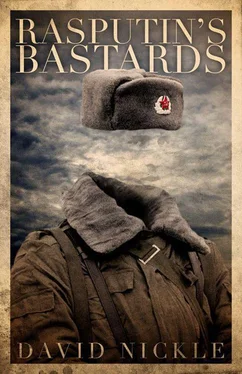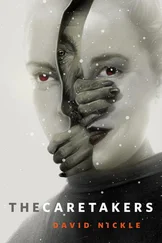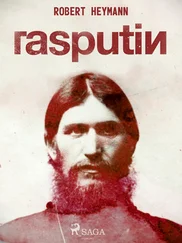“What I tell you — gambling and porn,” Bucci snorted. “Fuckin’ Internet.”
“Where is Pokrovskoye in all of this?”
Flavio typed quickly. “There,” he said.
The computer had highlighted a single sentence:
“ ‘Ah, my lovely vixen, if you are very good, I shall return you to my harem, in the town of my birth Pokrovskoye,’ said the amply endowed monk as Lady Tanya squeeled in extatic delight .”
“ Ecstatic delight ?” Flavio shook his head. “Who writes this shit?”
But Shadak moved away. For the first time in days, he felt a genuine smile creeping across his lips.
“Rasputin’s birthplace,” he said, and reached into his jacket pocket — where the photograph of the bastard Alexei Kilodovich rested. “New Pokrovskoye.” He turned to Bucci. “Who do you think was born there?”
Bucci shrugged.
“I need to go upstairs,” said Shadak.
“Back to the bridal suite?”
“No. The 14 thfloor. I need to see the tank. And then—”
“Then?”
“Then,” said Shadak, “we need to go north, I think.”
Bucci looked at him quietly for a moment. “You know about this shit, don’t you?”
“I know about this shit,” said Shadak gravely and Gepetto Bucci nodded. “So north,” he said, “it is.”
Alexei stood in front of the lighthouse door and wiped his mouth. The sun was low in the sky now, and it etched his shadow on the rough stone of the building. At his feet, poor young James was barely able to move he was so intoxicated. The stink of puke and sweat and alcohol drifted out of his pores like a mist. Alexei allowed himself a cold little smile: let Holden Gibson try and dream-walk this young wretch now. James’ inability to hold his liquor had proven Alexei’s salvation.
“James,” said Alexei. “Can you walk?”
James looked up at him with red, stupid eyes. Alexei nudged him with his toe.
“Up,” he said, and scooped his hand under the boy’s arm. He hauled him to his feet. “We’re going back inside.”
James got up with considerable difficulty, and Alexei walked him back into the lighthouse. He sat him down in a chair, then gathered some rope he’d found in a box underneath the bed, and wrapped it in tight coils first around the boy’s legs, and then his arms. He tied it firmly, but not too tight. He didn’t want to hurt the kid. He pushed a bucket up to James’ feet.
“You need to sick up,” said Alexei, “use that. You need to piss? I’m afraid there’s no easy way.”
James looked at Alexei.
Alexei nodded. “It’s an indignity, I know,” he said. “But nothing really, compared to the things that Holden Gibson has put you through. That Fyodor Kolyokov has put me through.”
“Goo’ poin’,” said James, language returning to him at last.
“Now I’m going to go away,” said Alexei.
“To ki — to kill Hol’en?”
Alexei snorted and waved at him dismissively. He brushed the handle of the gun tucked into his trousers, and stepped back outside.
Was he going to kill Holden Gibson? It was an idea, Alexei admitted. Probably he would have to kill someone before this thing played itself out. But Gibson, necessarily?
Alexei hurried back to the long staircase where the Koldun had left him earlier that day.
Now there was someone who was a candidate for killing. When they first met, the old man Vasili Borovich had seemed like an ally. Alexei was sorely tempted to reassess that, and cast the Koldun in Holden Gibson’s camp. After all, it was the Koldun who sent Alexei alone to the lighthouse. Where Holden Gibson had sent an agent — a puppet, really — to interrogate and kill Alexei.
It was a tempting theory. But truly, if the Koldun and Gibson were working together, and killing Alexei was their shared objective, it would have been simpler to murder Alexei as he slept. No — there was more to this place and the people here than simple murder.
And, he began to think, there was perhaps more to himself than simple murder too. Would the day end in killing at all? In the sobering summer air, Alexei began to wonder about that. Heather had set him up early to murder Holden Gibson. But how many times had he hesitated? Lost his nerve? Rationalized it away?
Alexei fingered the butt of the Glock. Was he really made for these things? If not these — then what? As he climbed down the stairs, Alexei came upon the thought that this place would, in its way, be just as useful in deciphering his present as was his metaphorical idyll into a childhood in assessing his history.
Alexei looked out over the harbour. There were more boats in it than before — which made a certain amount of sense. The sun was going down, casting a long, blue shadow over the breadth of the village. Lights were coming on in the buildings already. The fishing boats would be coming in for the night.
But he began to count. There were more boats there, really, than a prodigal fishing run could account for: more boats than there were moorings.
The stairs bottomed out in a yard, behind a two-storey wooden building that looked as though it might be a store. The back door stood ajar, and as Alexei listened, soft music drifted out. He approached the back of the building through the tall grass of the rear yard. The music was familiar — a Russian singer, bass. Singing to someone called Natascha.
“Rebroff,” said Alexei, as the recognition dawned. “Ivan Rebroff.”
Alexei remembered. Ivan Rebroff was an old Russian singer from the 1970s; a big round-faced Cossack, with an incredible vocal range who lived in a chateau in Austria with a couple of Siberian tigers for pets. Alexei had apparently listened to him quite a lot at one point, because he found himself humming along with the ballsy lament.
Alexei cracked open the door. It was a grocery — the sort of grocery you get in isolated little towns like this: a long room with sparsely filled shelves, with rows of old fluorescent tubes lighting everything a grey that flickered. A young woman sat behind a countertop, staring vacantly out the window. She was slight, long dark hair dangling in braids from the back of her skull. She reminded Alexei of something. Like the song, it was a memory unplaced.
“Hello,” he said.
The woman shook her head, dislodging a daydream.
“Oh. Hello. I did not see you come in.”
“Quite all right,” he said. “Sorry for sneaking up on you. Nice music.”
“Yes. It’s good. Can I help you with something?”
Alexei sidled up to the counter. There was a row of chocolate bars. Packages of cigarettes lined the wall behind her.
“I’m afraid I don’t have any cash on me,” he said.
The woman shrugged. “I’m afraid I don’t have a cash register. You want something to eat? You’ve been drinking — I can smell it. Food will take the edge off the headache.”
Alexei reddened. He’d hoped the little binge had been long enough past that no one would notice. The girl had a point, though.
“For free?”
She smiled. “We’re all family here,” she said.
“Maybe some cashews,” he said.
“Help yourself.”
Alexei munched on the cashews and listened to the rest of the song, and looked around. As he did, it became clear that the absence of a cash register was far from the strangest thing in this store.
For one thing, the shelves weren’t stocked with the hair combs and the cans of creamed corn and the salsa dips for the real Mexican tortillas in the salty snack section that you’d expect to see in an outpost grocery. In their place were little tins of Russian caviar and jars of truffle oil that sold in New York for $50 a bottle. A small open refrigerator was stuffed with fresh-looking roasts and exotic fowl wrapped tight in plastic. Through the cereal aisle, Alexei could make out a wine rack. There were no cheap wine boxes in sight, and he suspected he wouldn’t find many screw-top bottles there either.
Читать дальше












